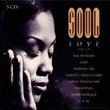| All Artists: I. Xenakis Title: Kraanerg Members Wishing: 2 Total Copies: 0 Label: Asphodel Records Original Release Date: 7/1/1997 Release Date: 7/1/1997 Genres: Dance & Electronic, Rap & Hip-Hop, Classical Styles: Ambient, Turntablists, IDM, East Coast, Experimental Rap, Ballets & Dances, Ballets, Historical Periods, Modern, 20th, & 21st Century Number of Discs: 1 SwapaCD Credits: 1 UPC: 753027097521 |
Search - I. Xenakis :: Kraanerg
 | I. Xenakis Kraanerg Genres: Dance & Electronic, Rap & Hip-Hop, Classical
Iannis Xenakis is the complete 20th-century composer--a pioneer of orchestral, electronic, tape, and computer music. His combined background as a musician, mathematician, and architect led to his conception of "Stochastic ... more » |
Larger Image |
CD DetailsSynopsis
Amazon.com Iannis Xenakis is the complete 20th-century composer--a pioneer of orchestral, electronic, tape, and computer music. His combined background as a musician, mathematician, and architect led to his conception of "Stochastic music," or composition based on the mathematics of probabilities. As impenetrable as this concept may appear on paper, the music itself packs a visceral and emotional punch that belies its arcane theoretical underpinnings. Now in his 70s, Xenakis is enjoying a golden age, as a new generation of admirers rises to the challenge of performing his demanding works. Leading this resurgence is Zacharie Bornstein's ST-X Ensemble, who here navigate the long-form electroacoustic work Kraanerg. Typically, Kraanerg is not about melody and harmony so much as the relationships between shifting constellations of pure sound. The presence of youthful sonic frontiersman Paul D. Miller (a.k.a. DJ Spooky) on electronics fittingly brings the composer's far-reaching influence full circle. --Dennis Rea Similar CDs
|
CD ReviewsBrilliant, But Not for the Neophyte Christopher Forbes | Brooklyn,, NY | 08/21/2002 (5 out of 5 stars) "Wow...this is a sonic tour de force. Xenakis was one of the most uncompromising avant-gard composers and this is one of his most uncompromising works. And at 75 minutes, this one's not for the casual listener. Those with open ears, though will be rewarded with a work of fire and power. Kraanerg is a 70 plus minute "ballet for orchestra and tape". The orchestra in this case is more of a chamber orchestra with winds and brass predominating. The tape is mostly interspersed with orchestral sections, not subsumed into the texture as in the works of Nono, but it is effective, not obtrusive as in Varese's Deserts. The work itself is a powerhouse. Xenakis is associated with his theories of "stochastic music" which use mathematical formula based on probability to generate seemingly random sound. As a result, Xenakis earned the reputation of being "cerebral". The reality is just the opposite. The stochastic procedures that Xenakis developed are just one part of his tonal palette, not the totality. Xenakis' music is fierce and passionately committed. And, along with Nono, Xenakis remained one of the few avant-garde composers who never compromised either artistic or political ideals. (Kraanerg is actually supposed to have been inspired by the 1968 Paris student protests, though I'm taking that fact from another reviewer, since the notes to this CD add precious little to your understanding of the piece.) The music is never sensuous, as Liegti can be; nor mystical, like Stockhausen, nor silly like Posseur, or "post-modern" like Berio. Xenakis is totally committed to his own stark sound world. The performance, to the best of my ability to tell, is superb. The work is conducted with drive and power, the playing is spectacular and the recording quality is crisp and clear. But, if you are curious about Xenakis, don't start with this CD. There is a CD in the Bernstein Century Series called Music of Our Time which has a decent rendition of Pithopratka on it. This is a better place to start (the piece is only 10 minutes long and the CD is at bargain price, so if you don't like it, you aren't stuck with it!) Bernstein was not a great conductor of this music, but he did it well enough for a neophyte to get a sense of it. If, however, you are already open to strong music, then get this CD. It's pwerful stuff and not for the wimpy!" Mindblowing! Dirk Hugo | Cape Town, South Africa | 03/30/2000 (5 out of 5 stars) "Anyone who has wondered how chaos theory could and should translate into music should check this out. It is not for the faint hearted, a rollercoaster ride into sonic mayhem where the composer's impeccable sense of aesthetics and consummate mathematical skills hold the frantic aural barrage together. Dense string harmonies jostle with wildly pitch-bent horn figures that challenge accepted musical sensibilities. All this against a backdrop of electronic textures that render "Kraanerg" one of the most multi-dimensional sonic adventures of all time. There's an added bonus of some fascinating liner notes as well!" Essential music of a chaotic century R. Hutchinson | a world ruled by fossil fuels and fossil minds | 06/16/2001 (5 out of 5 stars) "This is a live recording of Kraanerg from New York City, 1996. Xenakis supervised the rehearsals, and was present at the performance. That should be enough to quell those who doubt the integrity of this version -- Paul Miller, aka DJ Spooky, handles the "quadraphonic ADAT" admirably! This is an electro-acoustic piece (75 minutes worth), but the electronics do not dominate. The ST-X Ensemble, formed by director Charles Bornstein specifically to perform the works of Xenakis in the U.S., places strings, woodwinds and trombones at the sonic forefront. Part of the electronic component includes tapes of a 1960s performance of the piece. Xenakis called his compositional technique "stochastic music," and although I have not seen a clear exposition, apparently it involves the use of mathematics, algorithms, to produce patterns. You can easily imagine that you are hearing the product of a complex equation while listening to Kraanerg! Here is Xenakis describing his experiences as a communist/anti-fascist partisan in Greece during World War II from the liner notes, translating them into his musical theory: "...the reports of dozens of machine guns and the whistle of bullets add their punctuations to this total disorder. The crowd is then rapidly dispersed, and after sonic and visual hell follows a detonating calm, full of despair, dust, and death. The statistical laws of these events, separated from their political or moral context, are the same as those of the cicadas or the rain. They are the laws of the passage from complete order to total disorder in a continuous or explosive manner. They are stochastic laws.""
|

 Track Listings (41) - Disc #1
Track Listings (41) - Disc #1


